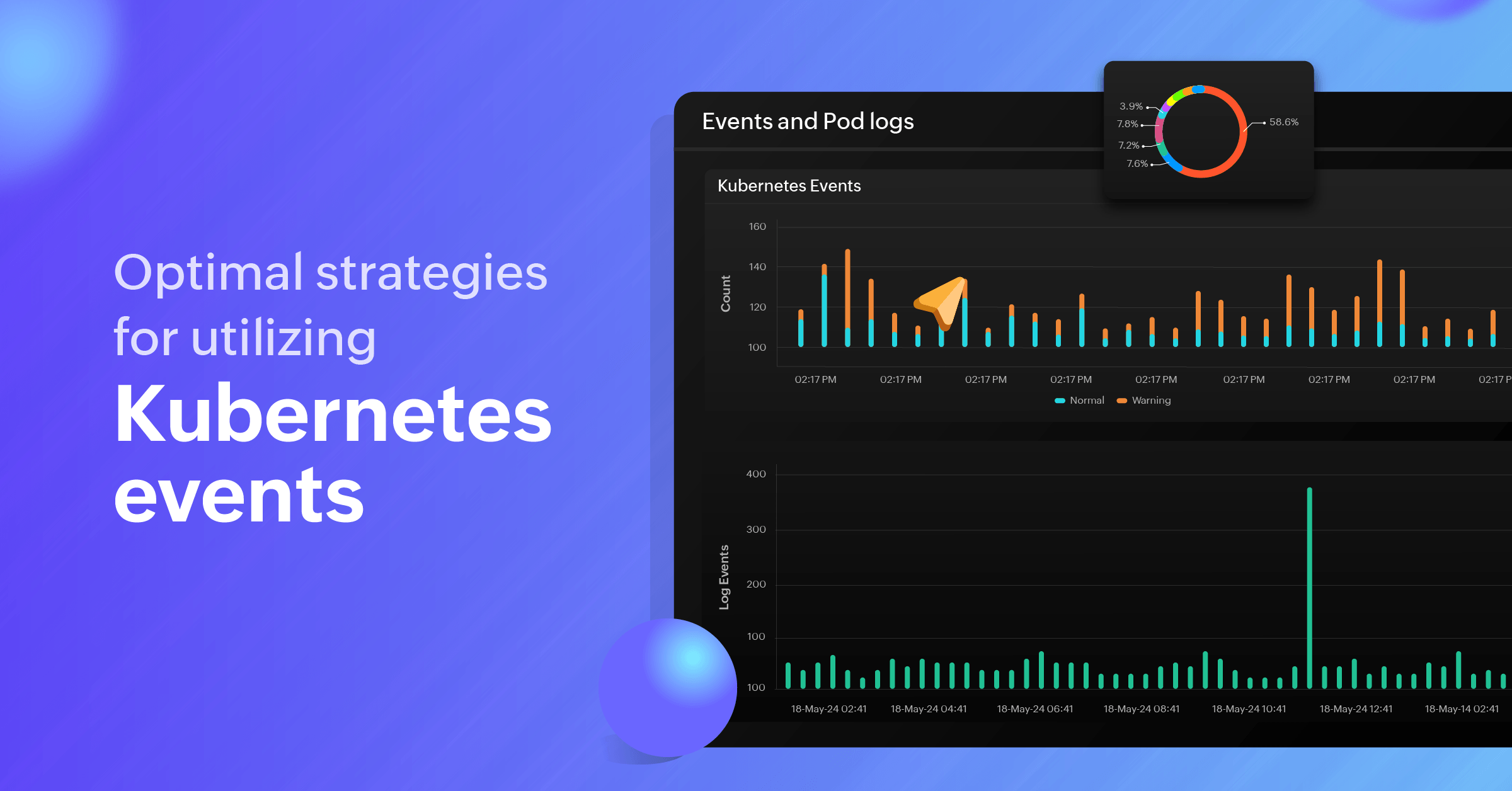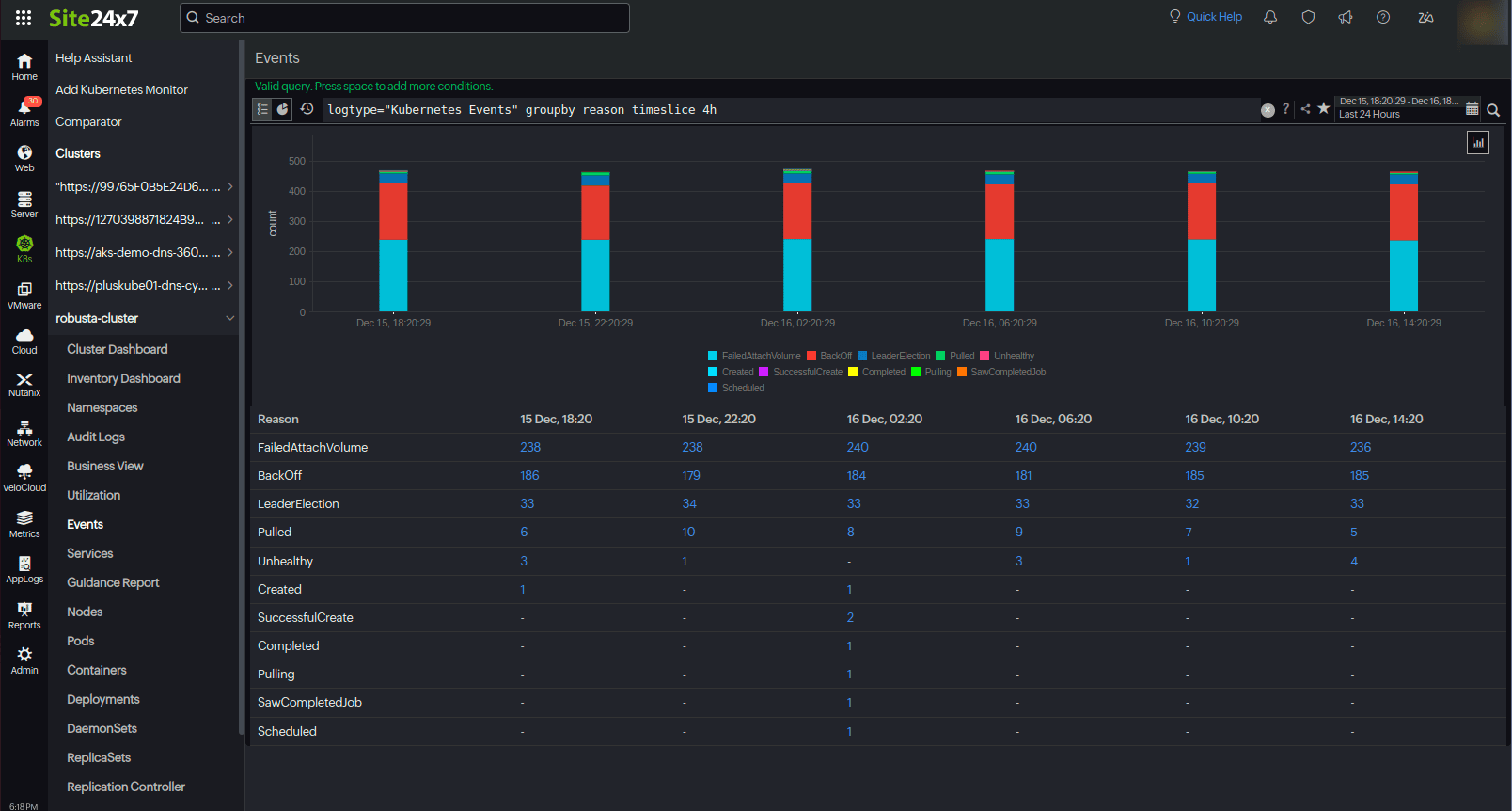What are Kubernetes events? How can you use Kubernetes events for effective monitoring?

Kubernetes events play a predominant role in helping ensure the peak performance of your Kubernetes clusters. These occurrences reflect important changes in states and offer immediate insights into the activities within your clusters. Whether a pod fails to initialize, a node becomes unreachable, or an application deployment encounters problems, Kubernetes events help you comprehend the root causes of these occurrences.
In this blog, we will examine how utilizing Kubernetes events alongside Site24x7 can facilitate enhanced cluster monitoring, allowing you to address problems before they affect your applications.
What are Kubernetes events?
Kubernetes events are time-marked logs of significant events in your Kubernetes clusters. They act as early signs of possible problems, providing essential information about the health and efficiency of your Kubernetes environment. By leveraging the complete capabilities of Kubernetes events, organizations can identify issues early, enhance resource efficiency, and maintain optimal availability for their containerized applications.
Every Kubernetes event generally includes:
- An object kind: The resource in question, like pods, nodes, deployments, or services
- An explanation: A brief overview outlining the cause of the incident (e.g., a pod crash or node malfunction)
- A message: Extra details providing background information for the event
- A paraphrase: The Kubernetes element accountable for creating the event (e.g., a kubelet or scheduler)
- A timestamp: The precise moment when the event was recorded
By monitoring these occurrences, Kubernetes admins can respond quickly, making sure that problems are addressed before they develop into larger issues.
The importance of Kubernetes events in monitoring
Kubernetes events offer a proactive alert system that aids in maintaining the stability and performance of your infrastructure. Here are the reasons they are essential for overseeing your Kubernetes environment:
- Proactive problem identification: Kubernetes events assist you in identifying issues as they arise, frequently before they impact users or the performance of applications. Whether a node disconnects, a pod fails to launch, or resource limits are reached, event-driven alerts notify you promptly, facilitating faster response times.
- Enhanced problem-solving: Although conventional logs can frequently be daunting and hard to interpret, Kubernetes events provide clear, organized information. They offer essential details, including the resource at hand, the cause of the problem, and the element accountable, making the troubleshooting process much more effective. With the provided information, the user can correlate the performance metrics for deeper troubleshooting.
- Enhanced alerting and minimized disruption: Combining Kubernetes events with monitoring tools such as Site24x7 enables you to establish accurate alerts for important problems. This alleviates alert fatigue by guaranteeing that only important, actionable events activate notifications, allowing your team to concentrate on what genuinely counts.
Leveraging Kubernetes events with Site24x7
Site24x7’s monitoring features for Kubernetes are crafted to track and evaluate Kubernetes events smoothly, allowing you to maintain awareness of your environment's health. Utilize Kubernetes events to develop a futuristic monitoring approach that improves operational productivity.

Track events in real time
When you are dealing with resource depletion, pod malfunctions, or node unavailability, get notified of these incidents instantly, facilitating rapid resolutions and averting service interruptions. Oversee your Kubernetes clusters in real time, monitoring essential events as they happen.
Address critical issues with event screening and personalized notifications
In a busy Kubernetes environment, not all events demand immediate action. Constant alerts for minor issues can overwhelm your team and divert focus from essential tasks.
The monitoring tool's filtering mechanism allows you to concentrate on the most significant events, like pod failures, resource limitations, or application issues. You can create personalized alerts according to the event severity, ensuring that you receive notifications only for critical issues. This method reduces distractions and enables your team to concentrate on essential tasks.
Gain insights with thorough visualizations and reporting
Kubernetes environments are complex, and troubleshooting them often requires a holistic view. Without consolidated insights into the CPU usage, memory usage, pod health, or node statuses, resolving issues can become challenging.
The robust dashboards provide a unified view of Kubernetes events alongside system performance metrics. By visualizing the event data with the CPU usage, memory usage, and health metrics, you gain actionable insights that help you identify root causes faster and resolve issues efficiently.
Surveil cluster conditions
Stable Kubernetes clusters are crucial for ensuring high availability. Issues like node failures, pod restarts, or deployment problems can disrupt operations if they're not detected early. Kubernetes events provide instant insights into cluster health, identifying issues such as unhealthy nodes or pods stuck in crash loops. With real-time notifications, you can address these problems before they escalate, enabling resilient, reliable clusters.
Optimize resource management and scaling
Efficient resource utilization is essential to avoiding bottlenecks and performance degradation. Without proper monitoring, pod resource limits or node capacity challenges can go unnoticed. Establish alerts for resource depletion occurrences and adjust your applications or redistribute resources prior to any decline in performance.
Enhance visibility by combining Kubernetes events with performance metrics
Siloed data can hinder your ability to troubleshoot effectively. Without correlating events with performance indicators, pinpointing root causes can be time-consuming. Integrate Kubernetes event data with performance metrics such as CPU, memory, and network usage. The deeper insights produced help you uncover root causes and improve your clusters' overall efficiency by linking system behavior to real-time events.
Uncover patterns by monitoring event trends over time
Recurring issues or scaling inefficiencies often go undetected without historical analysis. Utilize the in-depth analysis of historical data to monitor trends in Kubernetes events as they evolve. This will assist you in recognizing repeated problems, enhancing resource distribution, and refining your scaling approach so you can avoid potential bottlenecks in the future.
Monitor application performance
Application-level performance issues are often linked to Kubernetes events like readiness probe failures, replica count mismatches, or deployment errors. By combining Kubernetes event data with application performance data, you can obtain detailed insights into the performance of individual workloads.
Strengthen security and compliance
Security and compliance rank as primary worries for any organization employing Kubernetes. Unauthorized access attempts, unusual resource usage, or misconfigured components can jeopardize your Kubernetes environment’s security and compliance.
Track security-related Kubernetes events, abnormal patterns in resource usage, and configuration changes. Get industry-approved security best practice recommendations to enhance the security of your Kubernetes environment with the Guidance Report. This helps you fortify your security posture while meeting compliance requirements.
To wrap up
Kubernetes events are integral to any effective monitoring strategy, offering valuable insights into your clusters' health and helping you address potential issues before they escalate. With the right tools, you can gain deeper visibility into your environment, optimize resource usage, and maintain peak performance for your containerized applications.
By leveraging real-time event tracking, advanced filtering, customized alerts, and detailed reporting, you can seamlessly integrate Kubernetes event monitoring into your DevOps and IT workflows. This approach ensures well-maintained, high-performing, secure clusters, empowering your team to focus on innovation and scalability.
Topic Participants
Grace Nalini